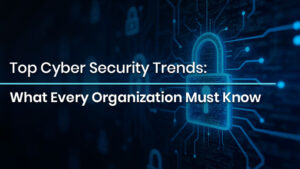
How to Harden Your Infrastructure Using CIS Benchmarks
How to Harden Your Infrastructure Using CIS Benchmarks Introduction As more organizations go faster with their digital transformation, the security and resilience of IT infrastructure
Limited-Time Offer! Get an exclusive 40% OFF on IPSpecialist Premium Monthly & Annual Plans. Use Promo Code: UPSKILLNOW at checkout.

How to Harden Your Infrastructure Using CIS Benchmarks Introduction As more organizations go faster with their digital transformation, the security and resilience of IT infrastructure

Azure Certifications – Validate Your Azure Cloud Skills Introduction Cloud computing has transformed the business landscape, providing scalability, flexibility, and affordability in a way

Top Cyber Security Trends: What Every Organization Must Know Introduction In an era marked by digital transformation, remote workforces, and rapidly evolving threat landscapes,
Table of Contents
DevOps has established itself as a must-have methodology for software development. Because of its alluring advantages, such as speedier software delivery, greater quality, and high customer satisfaction. DevOps, which eased remote collaboration to allow agile development techniques and infrastructure adaptability, rose to prominence during the epidemic. In fact, in 2021, 83 percent of studied companies will have incorporated DevOps practices.
Microservices architecture divides monolithic applications into small, self-contained parts known as services. DevOps teams benefit from increased agility and scalability throughout the software development lifecycle as a result of this. Rather than scaling an entire program at once, DevOps teams can expand each application segment according to business needs. Furthermore, the microservices design allows developers to deliver tiny improvements or functions without affecting the overall code base.
In 2022, the DevOps concept is expected to gain significant traction. However, it’s important to remember that poor microservice implementation can have serious consequences, including data loss and security threats. This is where Veritis enters the picture. Veritis can help you stay competitive by using evolving DevOps ideas and trends as a trusted technology partner.
The high CAPEX and OPEX of server infrastructure are the primary drivers of serverless adoption. Flexibility, reliability, speed, and cost-effectiveness are also key benefits of serverless architecture. Serverless computing allows businesses to focus their resources on key business activities by eliminating the requirement for infrastructure administration.
Furthermore, serverless computing eliminates the risk of potential maintenance issues for DevOps teams. The serverless architecture industry is expected to increase from USD 7.6 billion in 2020 to USD 21.1 billion in 2025, owing to these advantages.
Many enterprises have turned to low-code to develop and deploy applications quickly in the face of the pandemic. By the end of 2022, the shift to low-code software is likely to have gained significant popularity. All owing to the increased productivity provided by the low-code methodology. Developers and DevOps engineers are expected to follow suit, using low-code tools with handy drag-and-drop elements.
Low-code adoption is projected to support the full software development cycle as it evolves. It will help with app ideation, software design, code development, testing, release management, documentation, and other aspects of software development.
In recent years, Kubernetes, an open-source container orchestration technology, has become a popular infrastructure trend (particularly on the operations side). Kubernetes, on the other hand, is expected to extend deeper into the software development realm in 2022, according to analysts. Starting a local Kubernetes cluster on a developer’s machine will be easier thanks to this paradigm shift. As a result, DevOps teams can take advantage of Kubernetes features earlier in the development cycle.
Many large organizations are incorporating and automating security into their DevOps operations to avoid cyberattacks. This allows DevOps teams to continuously monitor and fix security flaws during development phases, resulting in faster delivery and higher quality.

Figure 1-01-: DevSecOps
It has already changed the way organizations work. It is now expected to take the DevOps ecosystem to the next level by accelerating and streamlining each phase of the SDLC. The use of AI to DevOps enables enterprises to fully automate the process. This feature decreases or eliminates the need for human interaction in processes ranging from code updates through deployment, freeing up time for the DevOps team.
Infrastructure-as-code and other coding-specific infrastructure solutions are growing even more popular, despite their popularity already. Because of the current and recent state of the world, an increasing number of businesses are attempting to scale out to the cloud. Engineers need the ability to move/scale/re-create whatever is running on the old on-prem servers quickly, whether it’s because offices have closed or it simply doesn’t make sense to maintain servers on-prem any longer.
The cloud’s future will be defined by infrastructure automation. There are various programs available, but HashiCorps Terraform is currently the most popular. Terraform is an infrastructure-as-code tool developed in HashiCorp Configuration Language (HCL) that allows you to describe how cloud (and on-prem) infrastructure should look.
Security is often one of the areas of any firm that is the most overlooked. According to Gene Kim (DevOps researcher), there is one security engineer for every 100 developers. Those figures are terrifying when you consider them. Especially since many firms would prefer to move quickly and worry about security afterward than do things correctly the first time.
The times, however, are changing. More people are working from home, more services are being run on the cloud, and more attacks are being launched daily.

Figure 1-02-: DevOps
It has always been difficult to assess an engineer’s worth. Engineers used to gain bonuses and acclaim if they had “X” number of lines of code in the early days of coding. However, the tech sector quickly discovered that this only resulted in the technological debt. Since then, it’s been a never-ending struggle to figure out how to measure value and, more crucially, what value means. There are numerous ways to quantify value with Value Stream Management.
The tech industry is always growing and evolving. There is no getting around it, therefore one thing to bear in mind is that you must be comfortable with change and adaptable. Learning new things is easy for engineers because they are naturally curious. However, for most people in management, especially those without an engineering background, it may not be their strong point, and that’s acceptable. As a result, management is beginning to realize that they cannot just imagine what a product or environment should look like and then hand it off to engineers to develop. Engineers must be included in the decision-making process instead.
DevOps will continue to evolve and pivot no matter what the future holds for IT enterprises. These DevOps concepts should be used by businesses to drive significant IT transformations that directly support their business objectives and ambitions.
If you are thinking about starting a career in DevOps then IPSpecialist is the perfect place to start. It offers career advice and assistance. What is IPSpecialist, exactly? IPSpecialist is the answer to all of your problems. Among other things, we provide online courses, study guides, e-books, practice questions, and quick reference sheets. IPSpecialist is an e-learning portal that provides online training as well as career advice to help you advance in your career. Survey our DevOps Courses now!
© 2025 All rights reserved | Privacy Policy | Terms and Conditions | Sitemap | Cookie Policy




